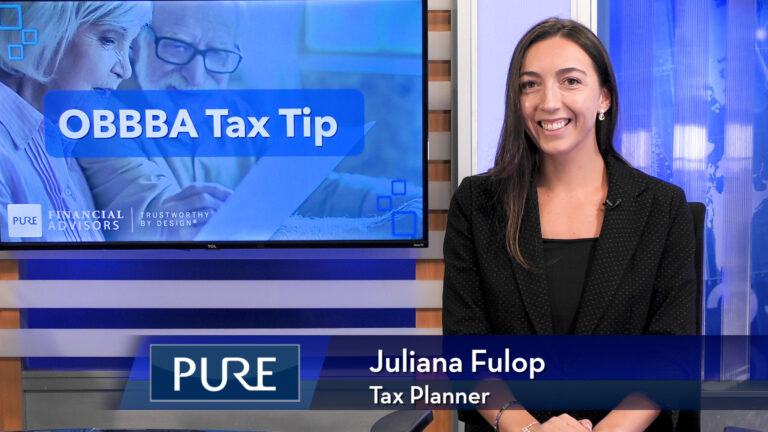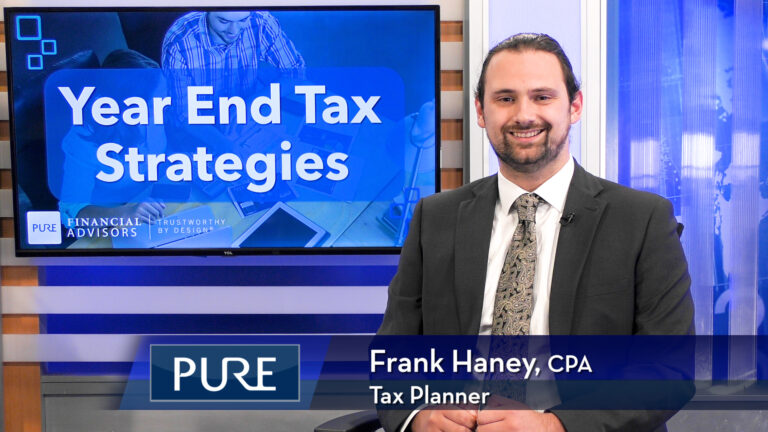You don’t need to be wealthy to need an estate plan. It’s simply a blueprint to ensure your wishes are followed if you pass away or become unable to make decisions. Pure’s Senior Financial Advisor, Robert Canavan, CFP®, AIF®, shares key reasons to create an estate plan—and how it can help you avoid future issues with asset management, taxes, and guardianship.
Transcript
The short answer is probably yes. Anyone with inheritable assets can benefit from a well-constructed plan. Why? This will protect your family and loved ones, it can help if become incapacitated, it can direct the distribution of assets after death, and if done correctly, (who doesn’t like this?), it can help minimize taxes. So, deciding where your money goes when you are dead is hardly a fun dinner topic. But neglecting the issue and not addressing it and not having the proper documents in place can be a total disaster for you and your heirs. So, if you have assets when you die and want to control where they end up, you should have some level of estate planning done.
Think about it like this: these are your final instructions from the grave – don’t you think that’s important to have that correct? How do you want to be remembered? What’s your legacy, right? That matters. Now, depending on the situation, estate planning can be pretty simple or get quite complex. So, one of the first moves you want to do is contact a good legal advisor.
Let’s go over a few quick examples of reasons why you might want to establish an estate plan:
- If you are a parent and have minor children an estate plan can help with the guardianship. If you and your spouse were to pass away, obviously this is crucial and something you want to have in place.
- If you have a large estate and you want to avoid the dreaded inheritance tax, proper estate planning can help with that as well. The plan will give instructions on not only who gets your assets but when they get them and how they get them. This can help avoid family conflicts and unwanted drama – making a time of total stress and confusion go a wee bit smoother.
- It can help you avoid the probate process, which in some states like California (where I am) can take well over a year. A properly constructed estate plan can help avoid probate entirely, keeping your affairs private, eliminating court fees, eliminating long delays, and any unnecessary lawyer fees.
- A few other examples of why an estate plan can be helpful would be: incapacitation, charitable donations, and even business succession plans.
So, you can see deciding if you need an estate plan for you is very unique and personal. If you are unsure on the next steps, reach contact Pure Financial Advisors and we’d be glad to be give you a free financial assessment.
Subscribe to our YouTube channel.
IMPORTANT DISCLOSURES:
• Investment Advisory and Financial Planning Services are offered through Pure Financial Advisors, LLC, a Registered Investment Advisor.
• Pure Financial Advisors LLC does not offer tax or legal advice. Consult with your tax advisor or attorney regarding specific situations.
• Opinions expressed are subject to change without notice and are not intended as investment advice or to predict future performance.
• Investing involves risk including the potential loss of principal. No investment strategy can guarantee a profit or protect against loss in periods of declining values.
• All information is believed to be from reliable sources; however, we make no representation as to its completeness or accuracy.
• Intended for educational purposes only and are not intended as individualized advice or a guarantee that you will achieve a desired result. Before implementing any strategies discussed you should consult your tax and financial advisors.
CFP® – The CERTIFIED FINANCIAL PLANNER® certification is by the CFP Board of Standards, Inc. To attain the right to use the CFP® mark, an individual must satisfactorily fulfill education, experience and ethics requirements as well as pass a comprehensive exam. 30 hours of continuing education is required every 2 years to maintain the certification.
AIF® – Accredited Investment Fiduciary designation is administered by the Center for Fiduciary Studies fi360. To receive the AIF Designation, an individual must meet prerequisite criteria, complete a training program, and pass a comprehensive examination. Six hours of continuing education is required annually to maintain the designation.













